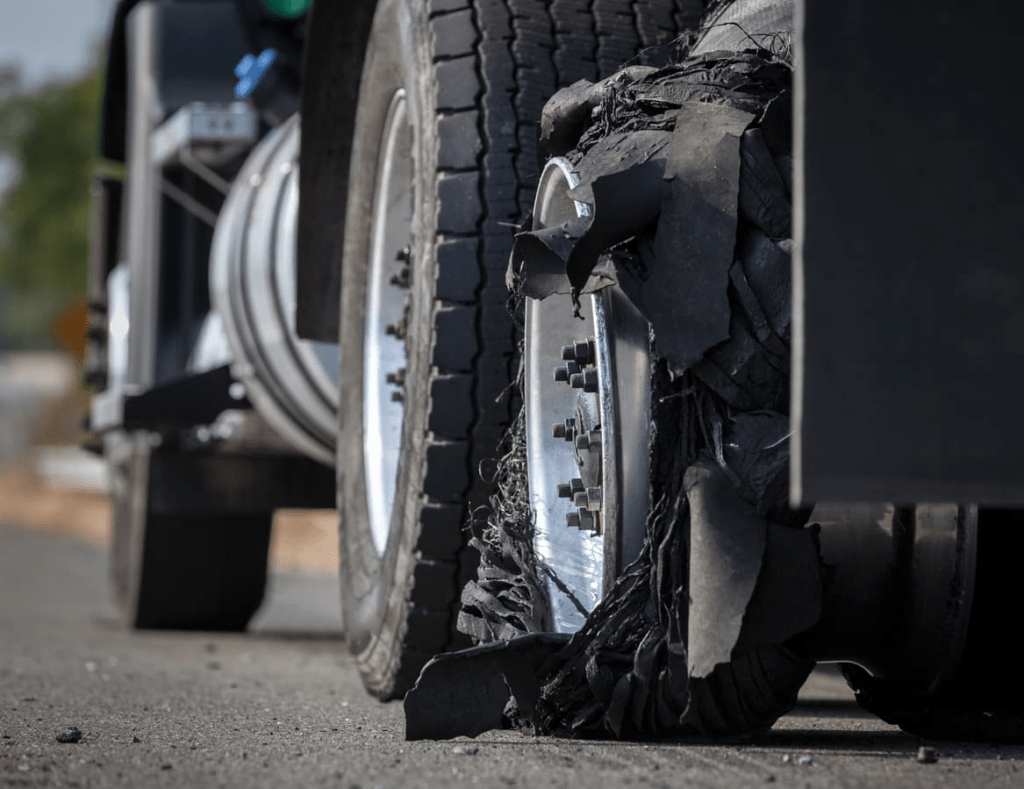When your tire blows out, be calm and hold onto the steering wheel. Avoid sudden maneuvers or slamming on the brakes, which could cause vehicle loss. Instead, gradually release the pedal and let the automobile slow down.
After regaining control, slowly guide the vehicle toward the roadside while watching for traffic. Use your danger lights to warn other drivers. Before examining the damage and determining whether to change the tire yourself or hire a professional, select a safe area to pull over. Remember, being calm and following these precautions can help prevent tire blowouts.

If your tire pops, what do you do? Imagine a popped tire while driving. Do not worry! Knowing what to do helps. Previously difficult, dealing with a blown-out tire is now essential for all drivers. When this happens, discuss the next steps. Maintaining your tires is essential for road safety.
Recognizing Signs of a Blowout
Warning Signs
If your tires look weird or your car shakes a lot, it could mean a blowout is coming. Watch out for strange noises too; they might warn you about a tire blowout. Stay safe on the road!
Importance of Prompt Action
If you see bulging or uneven tire pressure, feel vibrations, or hear weird noises from your tires, take action right away. This can help you avoid bigger problems later and keep you safe on the road.
Identifying the Sound of a Tire Blowout
Reacting to a Loud Boom
If you hear a loud boom while driving, it could be a sign of a tire blowout. Your immediate reaction should be to keep calm and avoid sudden movements.
Stay focused on controlling your vehicle by keeping both hands on the steering wheel. Gradually ease off the accelerator, but do not brake suddenly, as it can cause a loss of control.
Listening for Other Sounds
Apart from the loud boom, listen for other noises like hissing or flapping sounds. These indicate air escaping rapidly from the tire, signaling a blowout.
Be attentive to any scraping or grinding sounds that might occur if the blown-out tire is dragging against the road surface. This noise can vary depending on whether it’s the front or rear tire that blew out.
Immediate Actions After a Tire Blowout
Stay Calm

When you experience a tire blowout, the first thing to do is to stay calm. By remaining composed, you can better handle the situation. Grip the steering wheel firmly and keep your focus on controlling the vehicle.
Checkout From Amazon
Remember:
- Staying calm helps in making rational decisions during emergencies.
- Keeping a steady hand on the steering wheel prevents swerving and maintains stability.
Control Your Vehicle
Avoid sudden movements like slamming on the brakes; this could lead to more issues. Instead, gradually release pressure from the accelerator pedal. Allowing the car to decelerate naturally helps maintain control over your vehicle.
Keep in mind:
- Abrupt actions may worsen the situation after a tire blowout.
- Releasing acceleration slowly aids in safely slowing down without losing control of your vehicle.
Responding to a Tire Blowout
Activating Hazard Lights
Activate hazard lights immediately after experiencing a tire blowout. This warns other drivers of the emergency situation.
Remember, safety comes first. By turning on your hazard lights, you alert drivers behind you about the sudden issue and reduce the risk of accidents.
Checking Surroundings and Steering Safely
After activating the hazard lights, assess your surroundings. Look for a safe spot to steer towards, like the shoulder of the road.
Steer carefully without abrupt movements to maintain control over your vehicle. It’s crucial to navigate slowly and steadily towards safety during this unexpected event.
Handling a Tire Blowout While Driving
Steering During a Blowout
If your tire blows out, don’t turn the wheel fast. Keep driving straight and slow down. Then, gently steer back on track. Don’t make sharp turns or try to fix it too much. Just focus on steering smoothly to get control back.
Slowing Down Safely
If your tire blows out, take your foot off the gas and let the car slow down. Then, move to the side of the road when it’s safe. Good things keep you in control and steady. Bad things: You might feel scared and need to stay cool.
Checkout From Amazon
Ensuring Safety During a Blowout
Maintaining Control
If your tire blows out, hold onto the steering wheel tight with both hands. This helps you stay in control of your car. Be ready for the car to go to one side and steer the other way to stay safe.
Staying Alert
Remaining vigilant and monitoring other vehicles on the road is essential during a tire blowout. Pay close attention when changing lanes or merging with the traffic flow. Being aware of your surroundings ensures everyone’s safety on the road.
- Keep both hands on the steering wheel.
- Counteract the pull by steering oppositely.
Safety Measures for Future Blowouts
Regular Maintenance
Tire wear and pressure should be checked regularly. This prevents sudden blowouts while driving. Keep your tires in good condition to avoid road blowouts. Tires last longer when rotated periodically to wear them evenly. Tire maintenance keeps you safe and saves money by preventing early replacements. Well-maintained tires rarely fail unexpectedly.
Weight Capacity Policy
Don’t overpack your car to avoid flat tires. Follow the weight limit for tire safety. Weight can weaken tires and cause blowouts when driving. Follow safe driving guidelines and maintain your tires. But if you don’t inspect your tires, they could blow out.
Preventing Tire Blowouts
Proper Tire Inflation

Maintaining tire pressure as recommended by the manufacturer is crucial. Underinflated tires are more prone to blowouts. Regularly check and adjust the air pressure.
It’s essential to replace old or damaged tires promptly. Worn-out tires have a higher risk of blowing out, especially when driving at high speeds.
Checkout From Amazon
Avoid Road Hazards
Make sure to watch out for things like potholes and stuff on the road that can mess up your tires. If your tires get messed up, they might pop while you’re driving. Remember to check your tire pressure, change old or damaged tires, and stay away from potholes on the road.
Insurance Coverage for Tire Blowouts
Review Policy Coverage
Make sure to look at your car insurance to see if it covers tire blowouts. Some policies might help pay for it if it happens because of certain things, like vandalism or bad roads. It’s important to know what your policy includes. If you’re not sure, ask your insurance company about what’s covered.
Contact the insurance provider
If your tire blows out, call your insurance company. Tell them what happened and ask how to make a claim. They will help you figure out what to do next.
* Good things:
Knowing your policy can save you money.
Talking to the insurer clears up questions fast.
Bad things:
* Not enough coverage could mean paying from your own pocket.
Final Remarks
If your tire blows out, stay calm and steer to the side. Keep safe by keeping your distance from traffic and using hazard lights. Check your tires often and know your insurance. Being prepared can help avoid future blowouts. Drive safely!
Frequently Asked Questions
What are the signs of a tire blowout?
When you notice vibrations, thumping sounds, or difficulty controlling your vehicle, it could indicate a potential tire blowout. Keep an eye out for these warning signs to stay safe on the road.
How should I respond immediately after experiencing a tire blowout?
Stay calm and grip the steering wheel firmly. Gradually ease off the accelerator and let your car decelerate naturally while guiding it to a safe spot away from traffic.
What safety measures can I take during a tire blowout?
Avoid sudden movements or slamming on the brakes when dealing with a tire blowout. Focus on maintaining control of your vehicle by steering gently in the direction you want to go.
Is there insurance coverage available for tire blowouts?
Insurance policies may vary, but comprehensive coverage often includes protection against damage resulting from a tire blowout. Review your policy details or consult with your insurance provider for specific information.
How can I prevent future occurrences of tire blowouts?
Regularly inspecting tires for proper inflation, tread wear, and damage is crucial to preventing unexpected blowouts. Avoiding overloading vehicles and driving within speed limits can help maintain optimal tire conditions.

